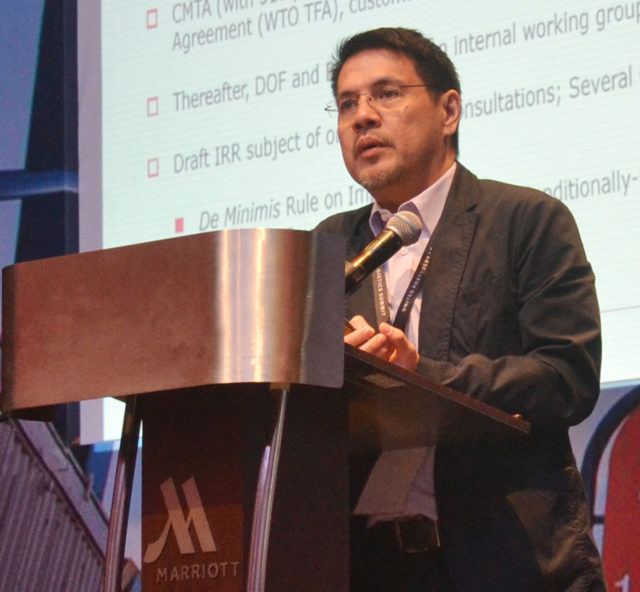Aside from implementing the Customs Modernization and Tariff Act (CMTA), there are three other elements needed to achieve genuine customs reform, according to a former Philippine Bureau of Customs (BOC) official.
These are automation, tax reform, and a shift in mindset, said customs expert Atty. Agaton Teodoro Uvero in a recent presentation at the United Portusers Logistics Summit in Manila.
Uvero, who was previously head of BOC’s Assessment and Operations Coordinating Group and is now a Department of Finance project consultant on the implementation of the CMTA and chairman of information provider Asia Customs & Trade, said it is hard for BOC to process 200,000 transactions monthly without automation.
He noted that during his stint at the BOC, they were able to increase automated transactions to 60% from 30%, but with parallel manual processing still in place for 95% of the transactions. This meant, he said, that manual intervention, whether a click of the finger or a written signature, was still required to release a shipment.
The 95% manual intervention, he noted, wielded “a lot of power to extort.”
Uvero had earlier said that without automation, the CMTA–the new law that overhauls BOC, aligning its operations with international best practices–would not by itself eliminate corruption in BOC.
He likened CMTA to a knife whose use depends on the user.
“When a knife is used by a chef, you can cook good food. But if it’s used by a thief, it can be used to extort money from people,” he pointed out.
“There’s an adage in business management… you cannot manage something that you cannot see,” he noted, adding that automation can make customs processes transparent.
Under the CMTA, the BOC should use information and communications technology to enhance customs control and support cost-effective and efficient customs operations geared towards a paperless environment.
Another measure needed to trigger genuine customs reform is to reform the tax policy by focusing more on the value-added tax (VAT), which accounts for the bulk of BOC’s revenues.
According to Uvero, 75% of what BOC collects is VAT, while only 15% is duty and 10% excise tax.
He pointed out that since the government can collect VAT as either input or output tax, importers and traders who do not pay the correct VAT for their importations can be charged based on their output VAT.
Uvero said zeroing in on VAT will stop BOC from putting too much focus on every transaction that comes its way and instead shift its attention to compliance of individual importers and traders.
As for excise tax, Uvero suggested that the government focus on fuel and automotive, which forms the bulk of this form of tax.
The third measure needed for customs reform, Uvero said, is to promote a change in mindset, putting more premium on “prevention [rather] than detention.”
He said focusing on individual accounts instead of transactions will help BOC more effectively address violations instead of perpetually running after transgressors. – Text and photo by Roumina Pablo









